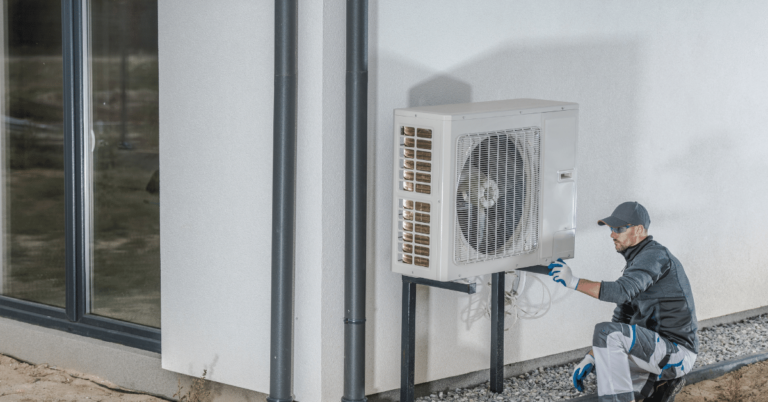The coldest month in the Denver metro area is January when temperatures reach 15.2°F overnight on average. If you don’t have a furnace or boiler in your home, chances are you have a heat pump that provides both heating in winter and cooling in summer. Heat pumps require specific care during winter to ensure they run smoothly especially considering that the one unit keeps you comfortable year-round. Transitioning between seasons is when your heat pump is most susceptible to malfunction so follow these tips to avoid any lapse in service.
What Is a Heat Pump?
Heat pumps are an energy-efficient alternative to air-conditioners and furnaces. According to the U.S. Department of Energy, heat pumps reduce electricity use for heating by 50%. They work by redistributing heat from the ground or air using refrigerant circulated between an outdoor compressor and an indoor air handler (also known as a fan coil).
As surprising as it might sound, the heat pump can extract heat from cold air even when it’s winter. To do this, it relies on pushing the refrigerant through an expansion valve, which causes the refrigerant temperature to drop significantly. The refrigerant becomes so cold to the point where the cold outdoor air is now the warmer object. Once that happens, the heat in the air is attracted to the super-cooled refrigerant and coil. An air return vent draws the heat in, then passes through the indoor heat pump system, warming it up.
Common Heat Pump Problems in Winter
A functional heat pump is crucial to your family’s comfort during winter in Denver. Take a look at the challenges that winter brings to your heat pump and how to handle them.
Icing Over
Do: A light layer of frost is normal, but if it extends outside of the coils or envelopes the entire unit, then it’s time to run the defrost cycle or pour warm water on the heat pump.
Don’t: Leave it covered in ice for long periods, as this damages the unit and inhibits the pump’s operation, which decreases your system’s heat output. Never use a pick or heavy tool to break up ice unless you want a costly repair bill! If running the defrost cycle or pouring warm water didn’t work, contact your Denver metro HVAC service partner to help. Also, do not cover the top of your heat pump to keep snow off of it as this creates a fire hazard.
Non-Functioning
Do: Check for blown fuses or a switched-off circuit breaker. If that’s the issue, replace the fuse and restart the breaker. The primary causes for this include faulty wiring, extreme cold, reduced airflow, and overvoltage.
Don’t: Try to resolve the problem yourself if the above doesn’t work, as it could indicate a broken start capacitor. Instead, contact our team of licensed HVAC technicians because replacing a capacitor requires electrical engineering skills.
Leak/Draining Issue
Do: Clear away any snow or debris obstructing your view of the heat pump components, as this will help you to pinpoint the leak location accurately. Make sure your unit is on a sturdy surface, lifted away from stacks of snow, and isn’t placed in a location that would be affected by gutter runoff.
Don’t: Jump to conclusions since not all puddles are leaks! It could be condensation, and melted ice from the defrost cycle. If the heat pump is indeed leaking, get it fixed by professionals as soon as possible. It will worsen over time, primarily caused by a corroded overflow pan or a clogged condensate drain.
Running Constantly
Do: Check that all of your windows and doors are closed to retain heat in your house better. Double-check that your thermostat isn’t set too high, as this often forces your setup to run continuously. Inspect your air filters and clean or replace them if they’re dirty. Look for refrigerant leaks as this will decrease pump efficiency.
Don’t: Turn off your heat pump if you spot any leaks. Doing so causes your backup heat source to turn on, which is more costly to run than your heat pump. Also, don’t close your vents to try and contain the heat in one room or area.
Blowing Cold Air
Do: Check the thermostat settings and ensure it’s at the temperature you want. Ensure it’s on AUTO mode not ON mode since the latter causes the fan to continue running despite any heat. Check that your heat pump isn’t blocked by snow, ice, or debris so that air can be pulled in freely.
Don’t: There’s no need to worry if the heat pump is on defrost mode because the warm air will return once the cycle is over.
Local Denver Heating and Cooling Services
If you’ve read this far, you’re now well-armed to defend yourself against heat pump issues in winter! However, if you have any doubts or need us to help, give us a ring at [theme_company_telephone] or send us a message. We’ve serviced the Denver metro area for over 40 years and can handle small repairs to complex HVAC equipment replacements. Check out our HVAC Preventative Maintenance Program for peace of mind that your heating and cooling systems are receiving the care they need year-round. Regular maintenance is key to avoiding costly emergency repairs and sets you up for comfort in any season!


